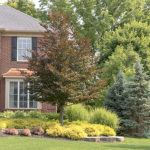Designing? Keep these things in mind

So, you’re ready to install some landscaping. What plants should you use, where, and how many?
First thing to consider is the environment
Shady, sunny, windy, sandy, clay, deer ridden, salty… all of these conditions can exist on the same property. It is important to choose plants that prefer the environment you are dealing with.

Every environment has plants that love it
You will need to know how the sun is tracking and consider existing large trees or other plants to know which areas will be sunny, shady, or both. Some plants are excellent for adapting to several different conditions. For instance, Diervilla (bush honeysuckle) grows in sun, shade, dry soil, alkaline soil, or acidic soil, and is deer resistant.

Draw your plan to scale using plant's mature sizes
Plan your landscape, on paper, to scale, and draw your plants at mature or near mature size. Scale is important for determining how much material you will need. Drawing plants at mature size will avoid overcrowding, and that in turn reduces maintenance as the plants have the room they need to grow and don’t have to be chopped into ugly unnatural shapes to control their size. This way, instead of becoming overgrown and ugly and needing redoing, your landscape will continue to improve with age.


Use garden art or boulders to fill in gaps while plants grow
If this leaves some open spots while you’re waiting for the plants to grow, these are perfect spots for garden art, sculptures, containers, bird baths, fountains, and accent boulders. Accent boulders are usually a good idea intermingled with large perennial beds to maintain some visual interest in the winter.

Use some evergreens for winter interest
And speaking of which, plant some evergreens so you have some winter color, and leave your ornamental grasses up until spring for some winter interest.

Use beds large enough to layer different sizes of plants
Another good reason to know how big your plants are going to get, aside from overcrowding, is so you can plant "stadium seating" style. Taller plants in the back, shorter in front.

Follow these guidelines, and your customers will be recommending for years to come.

